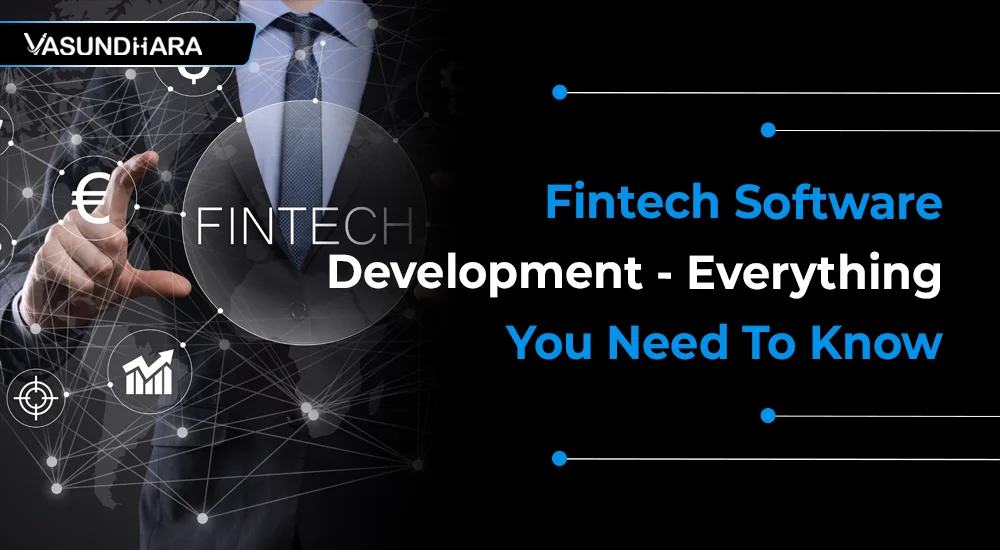Fintech Software Development - Everything You Need To Know


- Aug 8, 2024



In a world where financial transactions are just a tap away and investment strategies are increasingly automated, the financial technology (fintech) industry is at the forefront of digital transformation. Imagine a world where traditional banking is seamlessly integrated with cutting-edge technology, where every financial transaction is secure, efficient, and personalized. This is not science fiction; it’s the reality shaped by fintech software development.
The evolution of fintech is akin to a financial revolution powered by innovative software that redefines how we manage, invest, and transact money. In this landscape, understanding the intricacies of fintech software development becomes crucial for businesses aiming to stay ahead. Whether you’re a startup with a groundbreaking idea or an established financial institution seeking modernization, the success of your fintech application hinges on sophisticated software development. And this is where Vasundhara Infotech, a leader in providing the best fintech software development services, can turn your vision into reality.
At its core, fintech software is designed to enhance financial services through technology. But what exactly does this encompass?
Fintech software refers to applications and platforms that facilitate financial transactions, investment, and management through digital means. It spans a wide range of solutions, including mobile banking apps, investment platforms, payment gateways, and more.
Facilitate secure online transactions between merchants and customers.
Use algorithms to provide automated investment advice.
Connect borrowers with lenders, often using alternative data for credit scoring.
Help users track and manage their expenses and savings.
Also read: How AI is Transforming the Financial Services Industry
Fintech software is designed to transform how financial services are delivered and consumed. They must include several key components to ensure these applications are effective and robust. Here’s a detailed look at the essential elements of fintech software:
Core banking systems are the heart of most financial institutions. They handle fundamental banking functions and processes, including:
Modern core banking systems need to be scalable and flexible to adapt to changing market conditions and customer needs.
Payment processing systems are critical for facilitating transactions and ensuring secure payments. Key features include:
Security is a paramount concern in fintech software, as it handles sensitive financial data. Essential security features include:
Fintech applications must comply with various regulations to operate legally and securely. Key compliance features include:
Data analytics and reporting tools are essential for making informed business decisions and improving financial services. These tools include:
Also read: Disclosing the Cost Models for Fintech App Development
Developing fintech software involves a complex and multi-faceted process that requires careful planning, execution, and continuous refinement. Each phase of the development process is crucial for creating a secure, efficient, and user-friendly financial technology solution. Here’s an in-depth look at the fintech software development process:
The journey begins with a clear idea and concept. This phase involves identifying a problem or opportunity within the financial sector that your software aims to address. Conducting thorough research is essential to validate your idea and understand the market landscape. This includes analyzing competitors, defining target audiences, and assessing market needs.
By understanding these aspects, you can refine your concept and ensure it meets the demands of the financial industry.
Once the concept is defined, the next step is to design and prototype the software. This phase focuses on creating a user-centric design that addresses the needs and preferences of your target users. It involves developing wireframes and mockups that outline the application's structure and user interface.
Prototyping allows you to visualize the software’s functionality and design before moving on to the development phase. Feedback from stakeholders and potential users during this stage helps refine the design and make necessary adjustments.
With a finalized design, the development phase begins. This stage involves building the software using a chosen technology stack. The technology stack includes programming languages, frameworks, databases, and tools that are best suited for the project. Development is typically divided into two main areas:
Backend Development: This involves creating the server-side logic, database management, and integration with external systems. Backend development ensures that the application can handle transactions, data processing, and interactions with other financial systems securely and efficiently.
Frontend Development: This focuses on building the client-side interface that users interact with. Frontend development involves creating a responsive and intuitive user interface that enhances the user experience. It includes implementing features such as dashboards, forms, and navigation elements.
Testing and quality assurance are critical to ensure that the software functions correctly and securely. This phase involves several types of testing:
Functional Testing: Verifies that the software performs its intended functions as expected. It checks for correct behavior in various scenarios and ensures that all features work properly.
Performance Testing: Assesses the software’s performance under different conditions, including high traffic or large volumes of transactions. Performance testing helps identify and resolve issues related to speed, scalability, and responsiveness.
Security Testing: Focuses on identifying vulnerabilities and ensuring that the software is protected against potential security threats. This includes testing for data breaches, unauthorized access, and compliance with security standards.
User Acceptance Testing (UAT): Involves real users testing the software to ensure it meets their needs and expectations. Feedback from UAT helps identify any usability issues or additional features that may be required.
Once the software has passed all testing phases, it is ready for deployment. This involves launching the application in a live environment where users can access and interact with it. Deployment strategies may include phased rollouts or full-scale launches, depending on the project's scope and requirements.
Post-launch, ongoing maintenance is essential to ensure the software remains functional, secure, and up-to-date. Maintenance activities include:
Bug Fixes: Addressing any issues or bugs that arise after deployment.
Performance Monitoring: Continuously monitoring the software’s performance to identify and resolve any issues.
Updates and Enhancements: Implementing new features, improvements, and updates based on user feedback and evolving market needs.
Compliance Checks: Ensuring that the software continues to comply with regulatory changes and industry standards.
The fintech software development process is a dynamic and iterative journey that involves careful planning, design, development, testing, and ongoing maintenance. Each phase plays a vital role in creating a secure, efficient, and user-friendly financial technology solution. By following these steps, you can develop a fintech application that meets the needs of users and stands out in the competitive financial technology landscape.
Also read: Top Reasons Why Business Should Invest in Fintech Apps
Fintech software development is a complex endeavor marked by several unique challenges that can impact the success and functionality of financial technology solutions. Navigating these challenges requires careful planning, technical expertise, and a proactive approach. Here’s a detailed look at the key challenges faced in fintech software development:
Navigating the complex regulatory landscape is one of the biggest challenges. Different regions have different regulations, and staying compliant requires constant vigilance and updates.
Protecting sensitive financial data from cyber threats is critical. Implementing robust security measures to prevent breaches and fraud is essential for maintaining user trust.
Many financial institutions use legacy systems that may not be compatible with modern fintech applications. Integrating new software with these existing systems can be complex and time-consuming.
The software must scale efficiently as user bases grow and transaction volumes increase. High performance and reliability under load are vital for a seamless user experience.
In fintech software development, several trends and innovations are shaping the future of financial services. Artificial intelligence (AI) and machine learning are enhancing fraud detection and personalizing user experiences. Blockchain technology is revolutionizing transaction security and transparency, while open banking APIs are fostering innovation by allowing third-party developers to create new financial services. Robotic process automation (RPA) is streamlining repetitive tasks, improving efficiency.
Additionally, advancements in biometric authentication and secure digital identities are bolstering security. These trends enhance functionality and drive efficiency and user satisfaction, setting new standards in the financial technology landscape.
Selecting an ideal financial software development company is crucial for the success of your fintech project. Here’s what to consider:
Look for a partner with extensive experience in fintech software development. Expertise in financial regulations and technology trends is essential.
Ensure that the development partner uses a modern and reliable technology stack that aligns with your project’s requirements.
Review client testimonials and case studies by evaluating the partner’s track record. This provides insight into their capabilities and the quality of their work.
A good partner should offer ongoing support and maintenance to address issues and update the software.
Vasundhara Infotech, a leading fintech software development company stands at the forefront of fintech software development, offering expertise and experience to bring your fintech ideas to life. With a proven track record and a commitment to excellence, Vasundhara Infotech is your ideal partner for developing cutting-edge fintech solutions.
Fintech software development is crucial to the financial technology landscape, driving innovation and enhancing financial services. Understanding its key components and development process, navigating challenges, and leveraging emerging trends are all essential for success.
Whether you're looking to build a new fintech application or enhance an existing one, Vasundhara Infotech’s team of experts is ready to help you achieve your goals.
Contact us today to start your journey towards financial innovation and success.
Copyright © 2026 Vasundhara Infotech. All Rights Reserved.